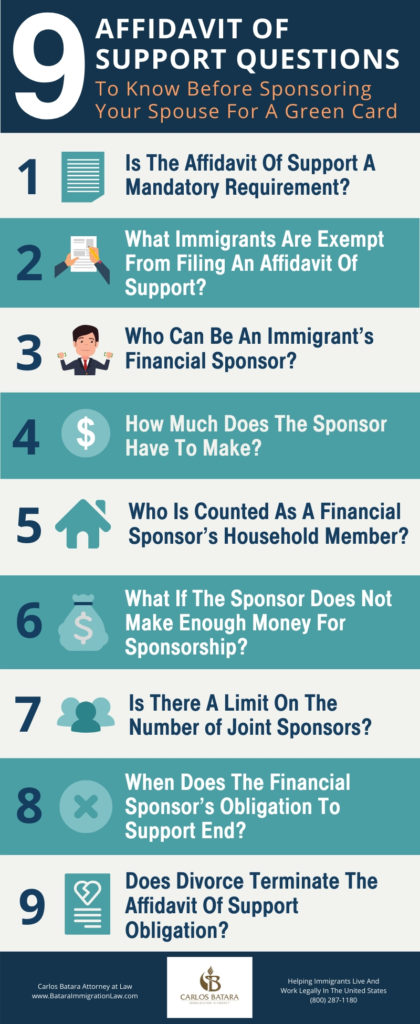
What Is An Affidavit Of Support?
The Affidavit of Support is a legal contract between an immigrant’s petitioner and the U.S. Government. By signing the Affidavit of Support, the petitioner is accepting financial responsibility for a spouse seeking permanent residence status.
Immigration officials do not want the soon-to-be green card holders to become public charges relying on government support, such as welfare, food stamps, or Medicaid. As a result, the petitioner must fill out a set of income-related documents which helps the government determine if the petitioner has enough funds to financially support the immigrant.
The Affidavit of Support is often referred to as an I-864 or Form I-864. The individual who signs the Affidavit of Support is called the financial sponsor. Although this person is usually the petitioner, it can be another person.
Affidavit Of Support Checklist
Although the I-864 looks like a simple form, completely it correctly is the one of the most common sources of errors in green card through marriage cases.
Here are nine important points regarding how to successfully prepare your affidavit of support paperwork to ensure victory in your family-based permanent residence matter.

Is The Affidavit Of Support A Mandatory Requirement?
Yes. The Affidavit of Support is a mandatory requirement in both adjustment of status and consular processing cases, as well as in some employment-based green card cases, unless the immigrant falls under an exemption.
What Immigrants Are Exempt From Filing An Affidavit Of Support?
As noted above, there are a few exemptions from the mandatory Affidavit Of Support filing requirement for the following immigrants:
- Self-petitioners under the Violence Against Women Act (VAWA)
- Self-petitioning widows/widowers of U.S. citizens
- Immigrants being sponsored who have already earned, on their own, 40 “qualifying quarters” of employment
- Orphans adopted abroad by U.S. citizens if the adoption occurred before the orphan acquires permanent residence and both adoptive parents have seen the child before or during the adoption
Who Can Be An Immigrant’s Financial Sponsor?
There are three requirements. Each sponsor must be:
- A U.S. citizen or permanent resident
- At least 18 years old
- Live in the U.S. or U.S territory
How Much Does The Sponsor Have To Make?
The financial sponsor must have an annual income that equals no less than 125% of the official U.S. poverty level.
The exact amount depends on the petitioner’s household size. For instance, if the petitioner is already supporting two children, then he or she has to meet the amount, set by the government, for four people – the sponsor, the immigrant to be sponsored, and the two children.
To meet this amount, the petitioner can use personal assets, such as savings and checking account balances, stocks, bonds, and the equity value of property owned.
Alimony and child support received also counts as income you can claim as a financial sponsor.
There is an exception for petitioners who are serving on active duty in the Army, Navy, Air Force, Marines, or Coast Guard. These petitioners only need to have an annual income of 100% of the U.S. poverty line.
Editor’s Note: For immigrant spouses-to-be, living abroad, planning to enter the U.S. on a fiancé visa, there are two different requirements. (1) The proper form to use is the I-134, not the I-864. (2) The financial sponsor must have an annual income that equals no less than 100% of the official U.S. poverty level, not 125%.
Who Is Counted As Members Of A Financial Sponsor’s Household?
To figure out if a financial sponsor meets the 125% income poverty line, the following persons are counted as part of the sponsor’s household:
- The sponsor
- The immigrant being sponsored
- The sponsor’s spouse
- The sponsor’s children listed as dependents on the sponsor’s income tax returns
- Any other individuals listed as dependents on the sponsor’s income tax returns
In addition, if the sponsor has agreed to sponsor other individuals, filed an I-864 Affidavit of Support form for them, and is still under such obligation, those immigrants count as part of the sponsor’s household.
Once the total number of individuals is known, the government utilizes its official Poverty Guidelines Chart, revised yearly for cost-of-living increases, to determine what level of income and assets the financial sponsor must have to meet the 125% poverty income requirement.

What If The Sponsor Does Not Make Enough Money Or Have Enough Assets?
If the petitioner does not make enough income to qualify as a sponsor, the green card applicant may find a joint sponsor.
A joint sponsor must also be willing to accept legal responsibility for supporting the immigrant.
Usually, joint sponsors are the immigrant’s family members, but they do not have to be related to the green card seeker.
Is There A Limit On Joint Sponsors?
Usually, joint sponsors are the immigrant’s family members, but they do not have to be related to the petitioner or green card seeker.
There is no limit on the number of joint sponsors who accept the financial responsibility for supporting a particular immigrant.
Joint sponsors must be willing to share their confidential tax returns and financial information with the government.
When Does The Financial Sponsor’s Obligation To Support End?
A financial sponsor’s obligation only ends if one of four matters take place:
- The death of either spouse
- The immigrant spouse becomes a U.S. citizen
- The immigrant spouse works for 40 quarters (10 years) in the U.S.
- The immigrant spouse moves out of the United States permanently
Does Divorce Terminate The Affidavit Of Support Obligation?
No. The financial sponsor’s obligation to support an immigrant continues even after a divorce occurs.
Even bankruptcy does not end many Affidavit of Support obligations.
Ready to take a serious and honest look at the strengths and weaknesses of your immigration case? Let’s get started with a personalized strategy and planning consultation . . .




